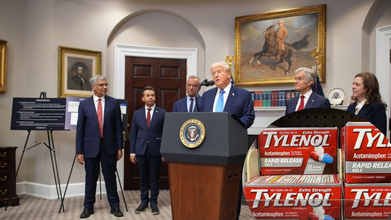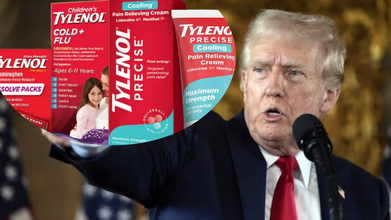- Health Conditions A-Z
- Health & Wellness
- Nutrition
- Fitness
- Health News
- Ayurveda
- Videos
- Medicine A-Z
- Parenting
- Web Stories
Heart Attack Signs You Might Miss: Woman Shares Warning Signs She Felt A Week Before

Heart attacks are often portrayed as sudden and unmistakable — crushing chest pain, gasping for breath, collapsing to the ground. But for many, especially women, the signs can be far more subtle. A recent case from Houston, Texas, has reignited the conversation around the often-overlooked symptoms of heart attacks and how misinterpreting them can delay life-saving treatment.
Nikki, a 46-year-old woman with no previous medical conditions, took to TikTok to share her personal story of surviving a heart attack. Her message? “Listen to your body.” What seemed like ordinary aches and fatigue turned out to be her body’s warning signals — ones she initially brushed off as symptoms of perimenopause.
Nikki’s story begins a week before her heart attack — with nothing more than a sore shoulder.
“It felt like I slept on it wrong,” she explained in a TikTok video that has now garnered over 7.5 million views. Like many women navigating their 40s, she chalked it up to perimenopause, suspecting a “frozen shoulder,” which is often associated with hormonal changes. The pain, while noticeable, didn’t alarm her.
But the next day, the discomfort persisted. More concerningly, it was accompanied by a wave of nausea that lasted about 15 minutes. Again, Nikki shook it off and resumed her daily routine.
On the morning of her heart attack, Nikki experienced the same dull shoulder ache and another wave of nausea. This time, though, things escalated. Her chest began to feel tight — a deep, squeezing sensation — and the shoulder pain started radiating down her arm.
Still, trying not to overreact, she took a warm shower to ease her symptoms. She felt better afterward and even proceeded to a doctor’s appointment for an unrelated issue.
At the clinic, Nikki recounted her symptoms and asked if she should go to the emergency room. The doctor told her that unless the symptoms reappeared, an ER visit might not be necessary. Reassured but uncertain, she left. That decision nearly cost her life.
Just an hour later, as she stepped out of a restaurant after lunch, Nikki’s symptoms returned with alarming intensity.
“My chest felt like it was being squeezed as tight as you could squeeze it. The pain was now radiating all the way down my arm. I started sweating profusely,” she recalled.
Realizing the gravity of the moment, Nikki drove herself to the ER — just one street away. She walked up to the counter and said, “I need someone to look at my heart right this second.” A nurse saw her trembling and rushed her into care. Within minutes, doctors confirmed she was in the midst of a heart attack.
Quick action saved her life. But her story reveals how easy it is to ignore — or misdiagnose — early signs, especially in women without known risk factors.
Nikki’s experience underscores a well-documented issue in cardiovascular health: women often experience different, less-recognized symptoms of heart attacks compared to men. While classic signs such as chest pain, shortness of breath, and left-arm pain are common in men, women may experience:
Fatigue
Indigestion or nausea
Pain in the jaw, back, or shoulder
Lightheadedness
Cold sweats
Because these symptoms don’t match the stereotypical heart attack portrayal, they’re often mistaken for other conditions like anxiety, menopause, acid reflux, or even the flu.
In Nikki’s case, shoulder pain and nausea were the warning bells — but they were too easy to dismiss until it was almost too late.
Why Heart Attack is A Rising Trend Among the Under-50s?
Heart disease has long been associated with older adults, but recent trends show an unsettling rise in heart attacks among those under 50 — especially women. In the UK alone, more than 2 million people are diagnosed with heart disease, and millions more live with undiagnosed high blood pressure, a leading risk factor.
Data from both the UK and US indicate that heart attacks in younger adults are increasing, driven by a blend of risk factors including:
Obesity
Sedentary lifestyles
High blood pressure
Diabetes
Chronic stress
Poor diet
What’s more, post-COVID delays in diagnostics, treatment, and even emergency response times have only worsened outcomes for younger patients.
Nikki’s case remains medically puzzling. Tests found no blockages or plaque buildup in her arteries — a common cause of heart attacks. Instead, a women’s heart specialist at The Texas Heart Institute attributed the event to a “perfect storm” — a combination of perimenopausal hormonal changes and a recent illness that may have inflamed her heart.
“She does not believe there’s a strong genetic link at this time,” Nikki shared. However, follow-up scans suggest she may have sustained some permanent damage to her heart, and she continues to undergo further testing and care.
Nikki’s viral TikTok struck a chord globally. Not only did it help other women connect the dots between vague symptoms and serious cardiac risks, but it also opened up a wider dialogue about how we talk about — and treat — women’s heart health.
In the comments, many thanked her for sharing symptoms that might have otherwise gone unnoticed. Others expressed alarm at how easily the signs could be brushed off.
In Nikki’s own words: “Had I not been one street away from the ER, I might not be here telling this story.”
This story serves as a stark reminder that heart attacks don’t always look like they do in movies — and they certainly don’t only happen to older men with a history of heart disease.
If you experience unusual fatigue, persistent shoulder or chest discomfort, nausea, or any new and unexplained symptoms, don’t wait. Trust your instincts. Seek medical attention immediately — even if you’re “too young,” “too healthy,” or “too busy.”
Tylenol And Autism: Trump Announces Link Between The Two, Science Does Not Back Him

Credits: Reuters, Tylenol
The official announcement linking Tylenol, a popular pain medicine with autism was made by President Donald Trump on Monday. In the announcement, he noted that the US Food and Drug Administration (FDA) will notify doctors that the use of Tylenol during pregnancy can be associated with a "very increased risk of autism", despite years of research and evidence that clearly point its safety.
"They are strongly recommending that women limit Tylenol use during pregnancy unless medically necessary," such as to treat fever, "if you can't tough it out," said Trump.
Tylenol, Pregnancy, And Childhood Autism
As per earlier studies, one of which is published in American Family Physician in 2014 also noted that during pregnancy most people used acetaminophen, sold under the brand name Tylenol. Acetaminophen is considered the one safe over-the-counter option for pain or fever for pregnant people. Other common pain relief options like ibuprofen or regular-dose-aspirin is available, however, they can pose serious risk in pregnancy and could lead to complications.
Is There Any Evidence That Show The Link Between Tylenol And Autism?
As per a recent 2024 study published in JAMA Network, titled Acetaminophen Use During Pregnancy and Children’s Risk of Autism, ADHD, and Intellectual Disability, there is no risk of autism for mothers who consume the medicine during pregnancy. The study notes: "Acetaminophen use during pregnancy was not associated with children’s risk of autism, ADHD, or intellectual disability in sibling control analyses."
James Cusack, chief executive of Autistica, a UK autism research and campaigning charity in London, who is autistic told Nature: "There is no definitive evidence to suggest that paracetamol use in mothers is a cause of autism, and when you see any associations, they are very, very small. At the heart of this is people trying to look for simple answers to complex solutions.”
Helen Tager-Flusberg, a psychologist who studies autism at Boston University, Massachusetts told Nature, "he better controlled studies are less likely to find even a small risk. And even then, what we're talking about is a minor association. … We do not think that taking acetaminophen is in any way contributing to actually causing autism.”
A study led by Viktor Ahlqvist, an epidemiologist at the Karolinska Institute in Stockholm (mentioned above, published in JAMA Network) is considered one of the biggest studies in this subject have also found no such link.
Ahlqvist’s team analyzed data from nearly 2.5 million children born in Sweden between 1995 and 2019, drawing from the nation’s detailed health records. These included acetaminophen prescriptions during pregnancy, self-reported use collected by midwives, and later autism diagnoses in children.
The findings showed autism in about 1.42% of children exposed to acetaminophen prenatally, compared to 1.33% among those not exposed, a difference Ahlqvist described as “very small.”
However, a previous study from 2022, published in Cureus, titled A Systematic Review of the Link Between Autism Spectrum Disorder and Acetaminophen: A Mystery to Resolve, concluded that "using acetaminophen during pregnancy was associated with attention problems and poorer executive development in children, especially with a longer duration of acetaminophen use". The studied reviewed 16 previously published studies and noted: "All 16 studies selected in our data showed a consistent association between acetaminophen and adverse neurodevelopmental outcomes."
Also Read: Tylenol And Autism: Trump, RFK Jr., And Officials To Link The Two In An Announcement Soon
What More Was Discussed In The Announcement?
At the White House, President Trump appeared alongside US Health and Human Services Secretary Robert F. Kennedy Jr., FDA Commissioner Dr. Marty Makary, NIH Director Dr. Jay Bhattacharya, and CMS Administrator Dr. Mehmet Oz. While the discussion included concerns over Tylenol use during pregnancy, Trump went further, calling for delays in childhood vaccinations, even suggesting postponing the hepatitis B shot, which has helped nearly eliminate infections in children, until age 12.
“It’s too much liquid, too many different things are going into that baby,” Trump said, offering no evidence to support his claims.
Scientific consensus remains firm: extensive research has shown no connection between vaccines and autism.
Trump praised Kennedy for bringing autism “to the forefront of American politics” and claimed, “We understood a lot more than a lot of people who studied it.” Kennedy, a longtime vaccine skeptic, has promoted theories linking vaccines to autism that experts widely dismiss.
By contrast, Kennedy and the FDA delivered more measured messages. Kennedy announced that HHS will launch a national campaign to inform families about safe Tylenol use during pregnancy. He stressed that acetaminophen should be used only when necessary, at the lowest effective dose, and for the shortest duration possible.
The FDA said it will begin revising acetaminophen safety labels and issue a letter to physicians. The agency emphasized that while some studies have noted an association, no causal link to autism has been proven, and decisions about Tylenol use remain with parents.
Tylenol’s manufacturer, Kenvue, strongly rejected any claim that acetaminophen causes autism, warning that misinformation could endanger pregnant women. “Acetaminophen is the safest pain reliever option for pregnant women throughout their entire pregnancy,” the company said, adding that untreated fever and severe pain can pose serious risks to both mother and baby.
Kenvue also urged expectant mothers to consult healthcare professionals before using any over-the-counter medication.
Tylenol And Autism: Trump, RFK Jr., And Officials To Link The Two In An Announcement Soon

Credits: Tylenol and AP
Autism and President Donald Trump, at this moment goes hand in hand, as ever since Trump's administration, with the help of his handpicked Health Secretary RFK Jr. decided to conduct a study to examine the potential link between vaccines and autism. The Centers for Disease Control and Prevention (CDC) had been told to study for the link between the two, a theory very well backed by President Trump and RFK Jr.
Up new is the recent plan to announce by the President on Monday that using Tylenol, a brand of medicine, used for reducing pain or fever, during pregnancy could increase the risk of autism. Two senior administration officials who have confirmed this news to POLITICO also said that advisory will be issued for pregnant women to only use generic acetaminophen for high fevers.
The officials have also told the media outlet that Trump may also highlight the benefit of leucovorin, which is a cancer and anemia drug as a potential therapy for people with autism.
"Autism Is Totally Out Of Control"
Not too long ago, on Friday, Trump himself said that he will soon be making a big announcement on the neurological condition. "Autism is totally out of control. I think we, maybe have a reason why," he told the reporters.
White House spokesperson Kush Desai, in a statement on Sunday said that the "announcement will make historic progress" in addressing rising autism rates. As per CDC's data, about 1 in 31 children aged 8 years has been identified with autism spectrum disorder (ASD). Among them 1 in 6 children aged 3 to 17 years were diagnosed with a developmental disability, during the period study of 2009-2017. These also included attention-deficit/hyperactivity disorder (ADHD)., blindness, and cerebral palsy.
The CDC also reported this spring that 1 in 31 American 8-year-olds was diagnosed with the condition in 2022, compared with 1 in 150 in 2000.
Why Autism? To Find The Answer Is HHS' Major Priority
Health Secretary Robert F Kennedy Jr. also promised earlier this year to have "some" answers to the question of why cases are increasing. This has been made HHS' major priority.
As per Kennedy, there are environmental factors too, though there is enough evidence to counter his argument. For him, vaccines are involved.
Read More: CDC Plans Vaccine-Autism Study Despite Scientific Consensus
Coming Back To Tylenol
Acetaminophen, sold under the brand name Tylenol, is the most widely used medication for pain and fever relief among pregnant women, who are generally advised to avoid ibuprofen (Advil) because of its link to miscarriage and birth defects.
According to a senior administration official, RFK Jr. and other top health leaders are expected to take part in an upcoming announcement. However, officials remain divided on how to address the sensitive issue of autism. Kennedy himself has expressed concern about a possible link between acetaminophen use during pregnancy and autism but has been cautious about issuing a public warning.
The administration is simultaneously preparing a broader autism initiative. About a dozen working groups are set to investigate roughly 30 possible causes of the condition. A supporting literature review, still underway, will not be released ahead of Monday’s announcement.
Earlier this year, Kennedy pledged to identify the cause of autism by September, a timeline many researchers considered unrealistic. The National Institutes of Health, tasked with leading the effort, has already tempered expectations, saying new grant funding will launch this fall, with meaningful updates not expected until next year.
This month, The Wall Street Journal reported that the Department of Health and Human Services (HHS) intended to connect autism risk to Tylenol use in pregnancy, as well as to folate deficiencies in women, with leucovorin being floated as a possible therapy. But officials later confirmed that no such report currently exists, as reported by POLITICO.
Meanwhile, a review published last month in BMC Environmental Health by Harvard’s T.H. Chan School of Public Health dean Dr. Andrea Baccarelli and colleagues linked acetaminophen use to autism and urged caution. The authors recommended that pregnant women take the drug only when necessary, at the lowest effective dose and for the shortest duration, but stopped short of advising a complete ban.
Industry leaders are pushing back. According to The Wall Street Journal, Kirk Perry, interim CEO of Tylenol manufacturer Kenvue, privately urged Kennedy not to name Tylenol as a cause. Kenvue, spun off from Johnson & Johnson in 2023, considers Tylenol a flagship brand.
In a statement to POLITICO, a Kenvue spokesperson rejected any claims of a link. “Over a decade of rigorous research, endorsed by leading medical professionals and global health regulators, confirms there is no credible evidence connecting acetaminophen to autism,” the company said. It added that discouraging Tylenol use could leave women facing “dangerous choices” between untreated pain, which itself can harm mothers and babies, and riskier alternatives.
Major medical groups continue to support acetaminophen use in pregnancy. The American College of Obstetricians and Gynecologists maintains that there is “no clear evidence” tying appropriate use to fetal developmental problems and warns against leaving pain or fever untreated.
So far, studies on acetaminophen and autism have largely been observational, pointing to associations but not proving causation.
World Alzheimer's Day 2025: Theme, Origin, And Significance

Credits: Canva
World Alzheimer’s Day, observed annually on September 21, once again drew global attention to the rising burden of Alzheimer’s disease and the urgent need for collective action. This year, the 2025 theme emphasizes the importance of early awareness, timely diagnosis, and stronger community support systems to help patients and families cope with the challenges of dementia.
Breaking Stigma Around Dementia
Alzheimer’s disease is the leading cause of dementia worldwide. It is a progressive neurological disorder that impairs memory, thinking, and the ability to perform everyday tasks. Over time, it not only affects individuals but also places a heavy emotional and physical toll on families and caregivers.
The stigma around dementia often prevents people from seeking medical help in the early stages. Symptoms such as forgetfulness, disorientation, or difficulty handling daily tasks are too often dismissed as “normal aging.” Experts, however, warn against such assumptions.
“Alzheimer’s is not simply about age-related memory loss, it is a serious neurological condition that needs to be identified early,” noted Dr. Pavan Pai, Consultant Interventional Neurologist at Wockhardt Hospitals, Mira Road, as reported in the Free Press Journal. “Recognizing these signs early allows us to intervene in time, slow down progression through therapies, and prepare caregivers to provide better support.”
By focusing on awareness and early detection, this year’s campaign aims to reduce stigma and empower families to act before the disease advances.
The Global Burden of Alzheimer’s
More than 55 million people worldwide currently live with dementia, and the number is projected to rise sharply with aging populations. In India and other developing countries, cases are steadily increasing, adding to public health challenges.
Alzheimer’s is not only a medical condition but also a social issue, as it disrupts family structures and places immense demands on caregivers. Recognizing this, World Alzheimer’s Day encourages governments, organizations, and communities to work together to improve patient care, caregiver support, and social acceptance.
Origin and History of World Alzheimer’s Day
The first World Alzheimer’s Day was launched on September 21, 1994 by Alzheimer’s Disease International (ADI), a federation of Alzheimer associations across the globe. It was timed to mark the 10th anniversary of the organization.
Over the years, the campaign grew in scale and visibility. In 2012, ADI expanded the initiative into World Alzheimer’s Month, transforming September into a full month of awareness activities. Since then, the annual campaigns have included educational seminars, fundraising walks, memory cafés, and advocacy programs.
These initiatives not only increase understanding of dementia but also provide platforms for patients and caregivers to share experiences and seek community support.
Why World Alzheimer’s Day Matters
World Alzheimer’s Day is not just about raising awareness but also about inspiring collective action. The day underlines several critical areas:
Early diagnosis: Detecting Alzheimer’s in its initial stages improves chances of slowing progression through therapies and lifestyle interventions.
Access to care: Patients need medical, social, and emotional support systems to live with dignity.
Reducing stigma: Myths and misconceptions must be challenged to encourage acceptance and compassion.
Research and innovation: Ongoing scientific research is essential to find better treatments and, eventually, a cure.
Around the world, communities organize activities such as memory walks, caregiver workshops, and awareness drives. These efforts encourage societies to become more dementia-friendly, ensuring patients and families do not feel isolated.
Moving Forward With Hope
As the global population ages, Alzheimer’s and other dementias will continue to challenge healthcare systems, families, and communities. World Alzheimer’s Day 2025 serves as a reminder that awareness, compassion, and timely intervention are powerful tools in easing this burden.
By breaking stigma, encouraging early diagnosis, and strengthening support networks, societies can not only improve the quality of life for those living with Alzheimer’s but also bring hope to millions of families navigating its challenges.
© 2024 Bennett, Coleman & Company Limited



